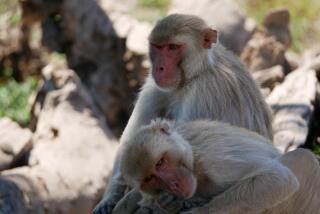Scientists Infect Monkeys With Human AIDS Virus : Medicine: Experiment could speed the process of testing vaccines and drugs, researchers say.
- Share via
In an advance that could hold great importance for developing AIDS vaccines and drugs, researchers for the first time have infected monkeys with the AIDS virus.
Scientists from the University of Washington in Seattle announced Thursday that they had infected 20 pigtailed macaques, a monkey species, with the human immunodeficiency virus, or HIV, which causes AIDS.
The success with the pigtailed macaque could speed the process of testing AIDS vaccines and lead to a better understanding of how the virus causes disease in humans, according to Michael B. Agy of the University of Washington, the principal author of the study. “This will enable more groups to do more studies quickly,” Agy said.
So far, all of the macaques that have been exposed to HIV have become infected. It is not yet known whether the macaques will become ill. In humans, it may take 10 years or more after the initial infection for AIDS to develop.
“For the last six months, we have felt very, very encouraged about the results,” said one of the researchers, William R. Morton, assistant director of the University of Washington’s primate research center. “It is clear that the pigtailed macaque is very susceptible to HIV infection.”
“The best possible (research) situation would be to have a human (AIDS) virus that infects a monkey,” said Dr. Anthony S. Fauci, director of the National Institute of Allergy and Infectious Diseases, which in part funded the research. “And that is exactly what this model is.”
While two of the macaques became infected 18 months ago, Morton, a veterinarian, said ittook months for the scientists to rule out the possibilities of laboratory contamination or a “fluke” occurrence.
Previously, researchers have only been able to infect monkeys with an AIDS-like virus found in monkeys but not with the same virus that infects humans. The monkeys go on to develop an AIDS-like illness. But because the virus, known as the simian immunodeficiency virus, differs significantly from HIV, studying it may be of less value to researchers.
Chimpanzees have also been infected with HIV, although they do not become ill. But there are problems with chimps as a viable scientific “model.” They are an endangered species, expensive, and hard to work with. They also appear only to be susceptible to some of the many strains of HIV.
By contrast, said Dani Bolognesi, an AIDS vaccine researcher at Duke University Medical Center in Durham, N.C., “I am impressed with the ease with which (pigtailed macaques) can be infected and the number of different strains (of HIV) which can be used to directly infect these animals.”
On Thursday, the journal Science, which will publish a paper covering the results in eight animals in its July 3 issue, took the unusual step of releasing to the news media the unedited manuscript from the University of Washington team. This was done because of publicity surrounding a presentation Thursday of the results at a public meeting at the National Institutes of Health, according to a spokeswoman for the journal.
The pigtailed macaque is found in the wild in Southeast Asia, primarily in Indonesia. It is not an endangered species. The Regional Primate Research Center at the University of Washington, which has about 1,000 of the animals, has the only significant breeding colony of the macaques in the United States, Morton said. There is also a breeding colony in Russia.
A qualified researcher can purchase a pigtailed macaque from the University of Washington for about $1,300, compared to a typical cost of $40,000 to $50,000 for a chimpanzee, if one could be found, Morton said. The macaques cost about $3.50 to $4 a day to feed and house, compared to a daily cost of $12 to $15 to support a chimp, he said.
In previous experiments, researchers have tried and failed to infect other monkey species, such as the rhesus macaque and the long-tailed macaque, with HIV.
Several years ago, the University of Washington researchers decided to test pigtailed macaques. They had found that these macaques could easily be infected with the AIDS-like virus from monkeys as well as a variant human AIDS virus, known as HIV-2, which is found in West Africa.
In the laboratory, scientists were able to infect white blood cells from macaques with four strains of HIV. They then injected the monkeys with either those infected cells or HIV itself.
They confirmed the animals became infected by isolating HIV from all eight monkeys tested.
Subsequently, the experiments have been extended to 20 macaques and five HIV strains have been tested, according to Morton. All five strains have produced infections.
The Washington researchers have begun experiments in the macaques that will lead to tests of potential AIDS vaccines. We have had “a tremendous number of calls” from other research groups and AIDS vaccine manufacturers, Morton said.
The findings will also spur scientists to find out why the pigtailed macaque can be infected with HIV, while other monkey species cannot. This line of research may provide clues about how to prevent HIV infection in humans and about the possibility of cross-species transmission of HIV from animals to humans.






